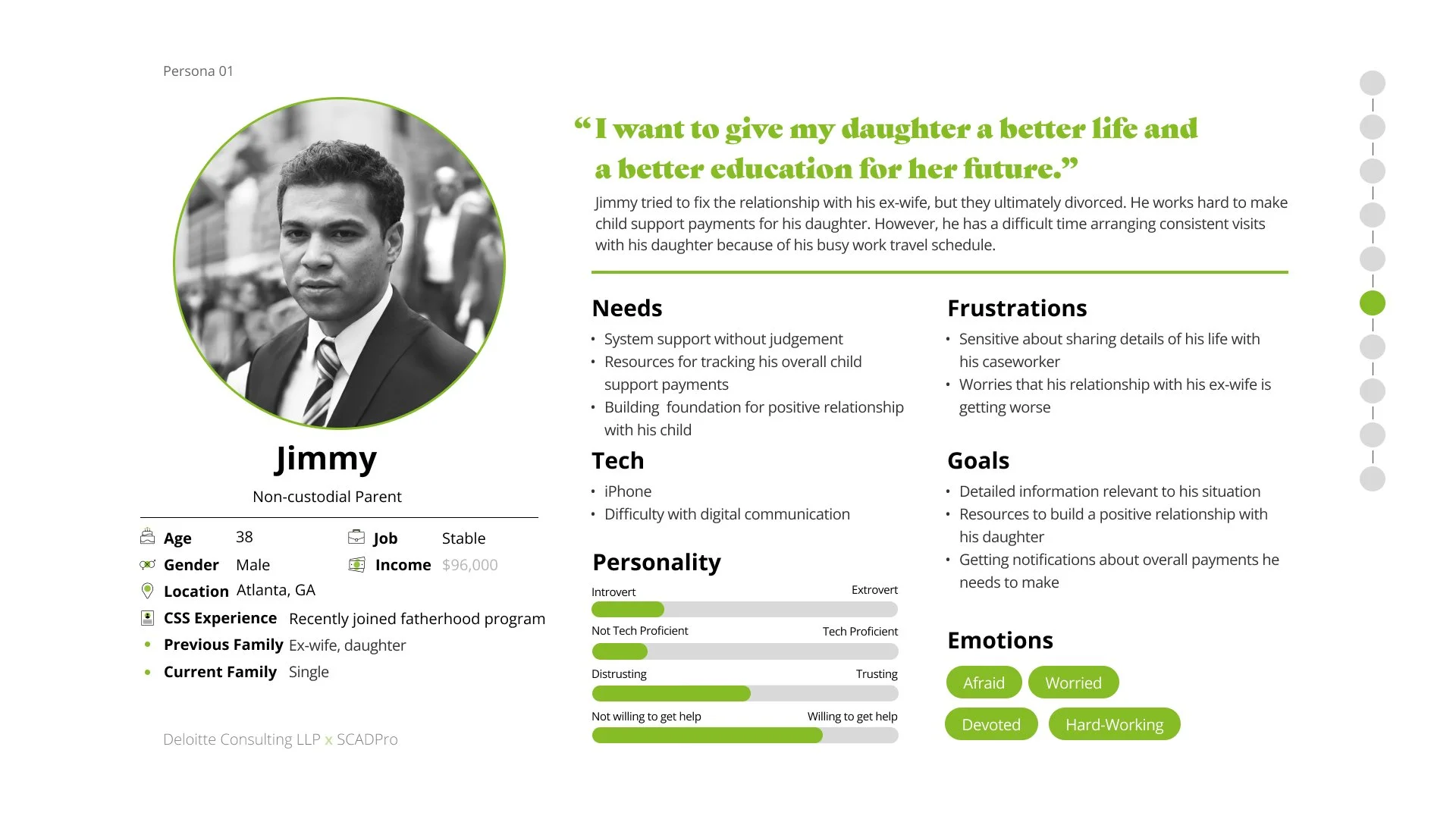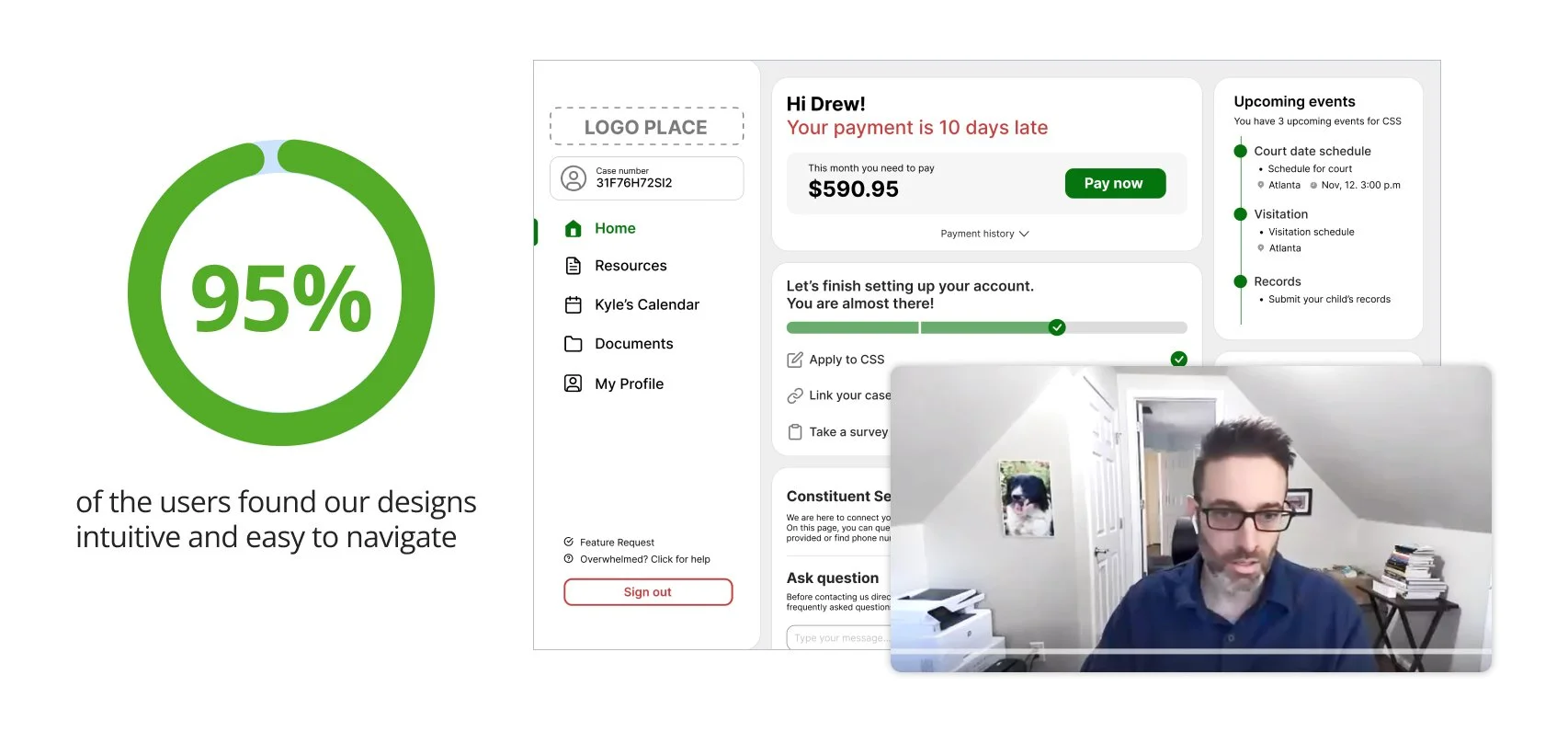Reimagining Child Support
Event
Industry Sponsored
Timeframe
Fall 2022 (4 months)
Role
UX Interaction Lead
Software
Figma and Adobe Cloud
My Role
UX Interaction Lead
Managed different stages of the design process with a focus on achieving optimal functionality and visual design.
Led the development of design systems and UI libraries to ensure consistency and a cohesive user experience.
Collaborated closely with the research team to better comprehend insights and develop areas of opportunity.
Served as a liaison between the research team and the interaction team.
The Task
Identify appropriate interviewees and determine relevant pain points and needs.
Thoughtfully communicate benefits of Child Support Services and build trust of potential custodial parents while increasing overall awareness of the program.
How can we increase positive engagement of non-custodial parents within the child support system?
How can we improve custodial enrollment through out-reach efforts at national and regional levels?
Increase custodial parent enrollment and engagement in Child Support Services.
Improve the digital experience of Child Support websites to increase engagement of non-custodial parents.
Challenges
Goals
Process
We used the Double Dimond Theory for our design process
Discover: Conducted primary and secondary research.
Define: Started to synthesis the information and identified key points and areas of opportunity.
Develop: Started developing and testing our product with real users to understand their interaction.
Deliver: Created a fully working prototype and national outreach campaign.
Discovery Phase
During the discovery phase we:
Identified target audience via online surveys.
Gathered multiple secondary research which allowed us to see patterns in behavior.
Carried out interviews with target audience to empathize with them and understand their problems and needs.
Found target audience motivations.
Understand inherent feelings of inadequacy by non-custodial parents
Motivations to enroll in CSS
HMW Questions
How might we create a personal and encouraging message that speaks to various users’ motivations and goals?
How might we build trust among parents, government programs, and workers?
How might we effectively introduce Deloitte's current communication strategies to both prospective and existing families involved in a child support program?
How might we improve the digital experience of child support services for parents who may be interested in enrolling?
How might we reorganize existing information and resources on the website for a more centric user experience?
Parental motivation to enroll in Child Support Services vary from parent to parent. Below are the 4 most common causes:
During the discovery phase we gathered primary and secondary research that allowed us to identify and empathize with out target audience.
Define Phase
During the define phase we collected data and insights, which we carefully analyzed and organized. This process helped us to refine and clarify our problem statement.
During the define phase we:
Synthesized and organized our data gathered from primary and secondary research.
Target the core issues we wanted to solve.
Refined and clarified our problem statement.
Started exploring possible solutions and located areas of opportunity.
Set metrics of success for our project deliveries.
User Personas & Journey's
Design Concepts
A. Co-Parenting
Communication feature for co-parent: Feature that includes visitation and scheduling capabilities, as well as a protected and monitored chat line, which would be consented to at the start of enrollment.
Full transparency on payment history: full transparency of child information to both co-parents. This includes a complete history of payments, amounts owed, and current case balances.
Access to the child’s records (Depending on court order): This allows both parents to contribute more to the child’s life. This feature can also offer vital information through health records if the child may be injured or ill while under the care of a co-parent or non-custodial parent.
B. Personalized Information
Communication feature for co-parent: Feature that includes visitation and scheduling capabilities, as well as a protected and monitored chat line, which would be consented to at the start of enrollment.
Full transparency on payment history: full transparency of child information to both co-parents. This includes a complete history of payments, amounts owed, and current case balances.
Access to the child’s records (Depending on court order): This allows both parents to contribute more to the child’s life. This feature can also offer vital information through health records if the child may be injured or ill while under the care of a co-parent or non-custodial parent.
Brainstorming
Low-Fidelity Wireframes
Develop Phase
During the develop phase we started developing mid-fidelity wireframes, and tested them with out target audience to challenge our assumptions.
User Testing
UI Library
Functional Accessibility & Iconography
Typography
Color Palette
Responsive Design
Delivery Phase
During the deliver phase, we created a fully working prototype in Figma based on all our research and past improvements, plus a national outreach campaign.
White Labelling
Application
State Branding
Attorney General of Texas
New Jersey Department Human Services
Georgia DCSS Portal
National Outreach Campaign







































